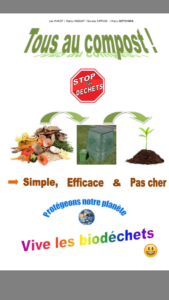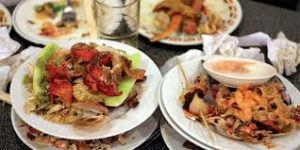The waste in our school
Our observation : Today, the waste of our plates in the cantine finish in the trash can and they aren’t recycle, and, they are lot of wasting, so, they are lot of waste who are no recycle.
Our projet : To strive about this wasting and the waste no recycle, we can recover the cantine’s waste and put this waste in a compost in the school. After, the compost can be give at a venture who work in the horticulture. If there are lot of waste, we can give this at a farmer. We think this action must be free.
The Second projet is to keep our waste in our school, to make a compost, and to use this to the plants in the school or for the education.
We can make a garden for the 6ème or use the compost to the experience with the plants.
We think this propositions can reduce the waste in our school or help people who work in the agriculture.
Matis Septembre, Nicolas Riffard,
Leo Marot, Mattis Mignot



LES DECHETS AU SELF
CONSTAT : Aujourd’hui, les déchets de nos assiettes au self finissent dans la poubelle et ne sont pas recyclés. Comme il y a beaucoup de gaspillage, cela fait beaucoup de déchets non recyclés. (1 tonne par mois ! voir article de Laurine sur la pesée des déchets au collège)
CE QU’ON PROPOSE : Pour lutter contre ce gaspillage et ces déchets non recyclés, nous pourrions :
1. Récupérer les déchets du self, et les mettre dans un compost derrière le collège. Ensuite, le compost ainsi formé pourrait être donné à une entreprise qui travaille dans l’horticulture (APAJH de Saint Sulpice par exemple) ou à des agriculteurs.
2. La 2ème solution est de garder nos déchets au collège, de les mettre dans le compost, et, ensuite, une fois transformés en compost, de l’utiliser dans le collège pour l’entretien et l’embellissement des espaces verts. Cela pourrait servir pour l’éducation, notamment pour les 6èmes en SVT avec le travail et les expériences qu’ils font autour des plantes et de leur environnement. On pourrait aussi créer un jardin de plantes aromatiques derrière le collège dont les aromates pourraient être utilisés par Bernard et son équipe en cuisine.
Nous pensons que ces idées pourraient fortement réduire les déchets alimentaires au collège.
Matis Septembre, Nicolas Riffard, Mattis Mignot, Leo Marot